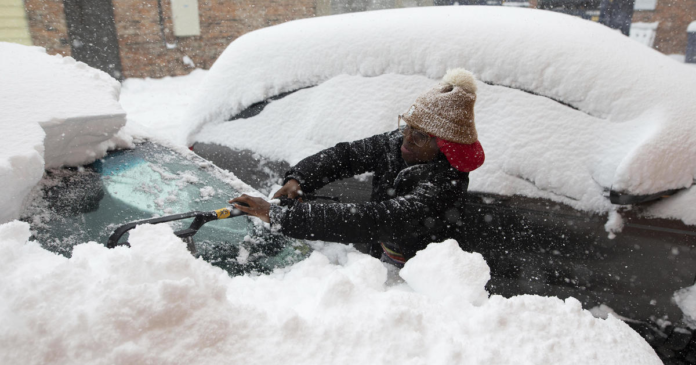Residents of northern New York state were digging out Saturday morning from a dangerous lake-effect snowstorm that had dropped more than 6 feet of snow in some areas and caused at least three deaths.
The Buffalo metro area was hit particularly hard, with some areas south of the city receiving more than 5 feet of snow by early Saturday. According to the National Weather Service, the suburb of Orchard Park, home to the NFL’s Buffalo Bills, reported 77 inches (196 centimeters) by early Saturday. About 80 miles (129 kilometers) northeast of the city, the town of Natural Bridge, near the Fort Drum Army base, reported just under 6 feet.
The inundation forced the National Football League to move Sunday’s game between the Bills and Cleveland Browns to Detroit.
“As a little fun fact, now that 77″ of snow has fallen in Orchard Park near the stadium, the storm is now officially [Bills quarterback] Josh Allen tall (6’5″)!” Erie County Executive Mark Poloncarz tweeted Saturday.
The National Weather Service predicted partial sunshine and a break from the snow on Saturday in New York, but not for long.
“Later on this evening and through early next week, we’re expecting another round of lake-effect snow for much of western New York,” National Weather Service meteorologist Zack Taylor told The Associated Press. Taylor, based in College Park, Maryland, said that could produce as much as 15 inches (38 centimeters) of snow for areas near Lake Erie and 2 feet (61 centimeters) for areas near Lake Ontario.
In the Buffalo area, Poloncarz tweeted that two people died “associated with cardiac events related to exertion during shoveling/snow blowing.”
“We send our deepest sympathies and remind all that this snow is very heavy and dangerous,” Poloncarz wrote.
A third person — a snowplow driver in the town of Hamlet, Indiana — was killed Friday when his plow slid off the pavement and rolled over, according to the Starke County Sheriff’s Department. Hamlet is about 30 miles (48 kilometers) from Lake Michigan.
Buffalo saw a record snowfall of 16.1 inches, Saturday, breaking the old record of 7.6 inches in 2014, according to the National Weather Service. A travel ban remained in effect for Buffalo as of 6:30 a.m. ET Saturday, Erie County Commissioner of Emergency Services Dan Neaverth said.
“We understand people want to get out but we need everyone to please hunker down for a bit longer because most neighborhood streets and secondary roads are not plowed,” Poloncarz tweeted Saturday morning.
“There’s absolutely no reason to be out there today, Neaverth said at a Saturday morning press conference. “The only people that need to be out there are public safety individuals. So please, stay off the roads.
The city of Buffalo has opened three warming centers — Tosh Collins Community Center, Machnica Community Center and Lincoln Field House Community Center — that will be available from 9 a.m. to 6 p.m. Saturday for those without power, Mayor Byron Brown tweeted.
The National Guard has been called in to help clear the roads, Neaverth said.
The storm’s effects varied widely in the region due to the peculiarities of lake-effect storms, which are caused by frigid winds picking up moisture from warmer lakes and dumping snow in narrow bands. Some areas of Buffalo were battered by blowing, heavy snow off Lake Erie while mere miles away, residents only had to contend with a few inches.
Time-lapse video showed lake-effect snow enveloping part of the city Friday morning.
New York Gov. Kathy Hochul declared a state of emergency Thursday for parts of western New York, including communities along the eastern ends of Lake Erie and Lake Ontario. The declaration covers 11 counties, with all vehicles banned from a stretch of Interstate 90.
A car carrying a TV news crew reporting on the storm got stuck early Friday and had to be pushed out of the snow by onlookers, WGRZ reporter Alexandra Rios said on Twitter.
“Our car got stuck after our 4:30a live shot,” Rios tweeted. “Then, at one point about 6 people gathered together to help us out.” She said they told her that Buffalo residents “always come together when someone is in need.”
Buffalo has experience with dramatic lake-effect snowstorms, few worse than the one that struck in November 2014. That epic storm dumped 7 feet (2 meters) of snow on some communities over three days, collapsing roofs and trapping motorists in more than 100 vehicles on a lakeside stretch of the New York State Thruway.




